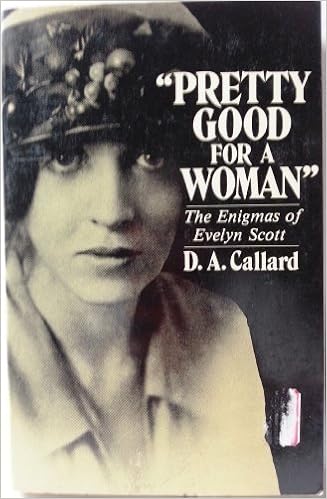

Queer Places:
30 Grove St, New York, NY 10014
Rosedale and Rosehill Cemetery
Linden, Union County, New Jersey, USA
 Evelyn
Scott (January 17, 1893 – August 3, 1963) was
an American novelist, playwright and poet. She was a friend and
correspondent with Emma Goldman.
Evelyn
Scott (January 17, 1893 – August 3, 1963) was
an American novelist, playwright and poet. She was a friend and
correspondent with Emma Goldman.
Mosaic of Fire examines the personal and artistic interactions of four innovative American modernist women writers—Lola Ridge, Evelyn Scott, Charlotte Wilder, and Kay Boyle—all active in the Greenwich Village cultural milieu of the first half of the twentieth century. Caroline Maun traces the mutually constructive, mentoring relationships through which these writers fostered each other's artistic endeavors and highlights the ways in which their lives and works illustrate issues common to women writers of the modernist era. The feminist vision of poet-activist and editor Lola Ridge led her to form friendships with women writers of considerable talent, influencing this circle with the aesthetic and feminist principles outlined in her 1919 lecture, "Woman and the Creative Will." Ridge first encountered the work of Evelyn Scott when she accepted several of Scott's poems for publication in Others, and wrote a favorable review of her novel The Narrow House. Ridge also took notice of novice writer Kay Boyle shortly after Boyle's arrival in New York, hiring Boyle as an assistant at Broom. Almost a decade later, Scott introduced poet Charlotte Wilder to Ridge, inaugurating a sustaining friendship between the two. Mosaic of Fire examines how each of these writers was energized by the aesthetic innovations that characterized the modernist period and how each was also attentive to her writing as a method to encourage social change. Maun maps the ebb and flow of their friendships and careers, documenting the sometimes unequal nature of support and affection across this group of talented women artists.
A modernist and experimental writer, Scott "was a significant literary figure in the 1920s and 1930s, but she eventually sank into critical oblivion."[1]
She was born as Elsie Dunn in Tennessee. Her first husband was Frederick Creighton Wellman, under his pseudonym, Cyril Kay-Scott, but she also had an affair with Owen Merton, father of Thomas Merton.
Scott later married the English writer John Metcalfe.[2]
She sometimes wrote under the pseudonym Ernest Souza, and under her birth name, Elsie Dunn. Her best known works are her two trilogies; the first consisting of "The Narrow House" (1921), "Narcissus" (1922) and "The Golden Door" (1923), and the second consisting of "Migrations" (1927), "The Wave" (1929), and "A Calendar of Sin" (1931). "The Wave" is considered by many to be her finest novel. Some of her other novels include "Breathe Upon These Slain" (1934), "Bread and a Sword" (1937) and her last novel, "The Shadow of the Hawk" (1941). She wrote autobiographical novels, "Escapade" (1923), "Eva Gay" (1932), and a memoir, "Background in Tennessee" (1937), and wrote the essay "On William Faulkner's The Sound and the Fury", which is included in an edited compilation of author William Faulkner's works. Biographies of her have been written by D. A. Callard, Robert L. Welker, Mary Craigg and Mary Wheeling Wright.
My published books: